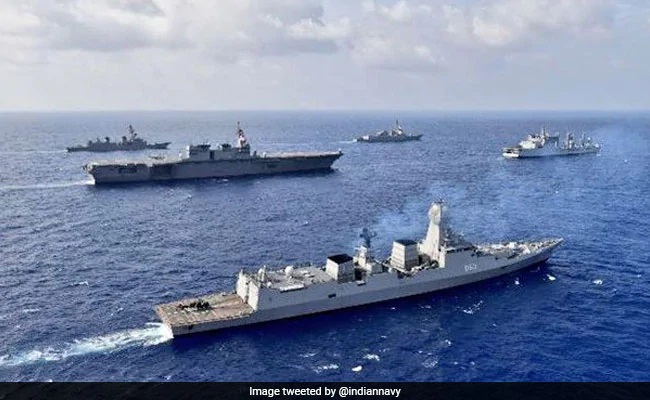India has recently dispatched four warships to the disputed South China Sea region to enforce India’s maritime claims in the world’s most controversially disputed waterway.
While geopolitical analysts and foreign policy pundits may dismiss this development as a routine exercise, it nevertheless highlights that India is no longer willing to remain a silent bystander and see its interests being compromised. It also signals a paradigm shift in India’s Beijing strategy.
A Goldmine of Resources
The South China Sea region is a resource-rich waterway with overlapping territorial claims of a number of countries in East Asia and Southeast Asia, what makes these maritime territorial claims all the more important is the fact that the region is resource-rich in hydrocarbon reserves and is an excellent chokepoint for any major power. Robert D Kaplan in his book ‘Asia’s Cauldron’ highlighted that the South China Sea region is responsible for the passage of 75% of South Korea’s and 90% of Japan’s oil and natural gas imports.
Besides this, what is more interesting-more than $ 50 billion worth of India’s annual trade of various hues and shades pass through this strategic waterway, so certainly this region from the resource and the strategic point of view is a goldmine. India can therefore ill afford to remain aloof with regard to the developments in this strategic region.
China Beware
India’s unexpected aggression has literally taken Beijing by surprise. India however must not let go of this opportunity. A new way of tackling the dragon in its backyard is by putting up a collective show of solidarity. At a time when global public opinion is against China with regard to its alleged role in the outbreak and spread of the Covid-19 pandemic, India can gain an upper hand in the battle of great power contestation.
India needs to entice its Quad partners in organizing naval exercises in the disputed region. Australia and Japan with whom China is having possibly the worst relationship in decades can become India’s natural allies in taking on the dragon. The South China Sea region is one place where India can take the fight against the dragon. India can also persuade Beijing’s neighbours particularly Vietnam, the Philippines, and Malaysia who are at the receiving end of Chinese aggression to join hands to rightfully claim their sovereign maritime claims in the region.
India can build an N-4+, i.e a naval coalition of the Quad plus countries to curb the dragon’s belligerent behaviour in the strategic region. It can extend the vaccine alliance it has built among its Quad members to include these countries as well to counter Beijing’s medicine diplomacy which has already spread to a large number of countries.

Trumping China with Formosa
A key aspect of outwitting China in this great power contestation is enlisting the support of Taiwan, which has for the last seventy years of its existence tried every possible method of protecting its sovereignty against Chinese aggression and has been largely successful. India must make outreach to Taiwan by selling arms to Taiwan- the Brahmos supersonic missiles and its Light Combat Aircraft (LCA) Tejas are good examples. Taiwan will prove to be a reliable ally in this great power contestation because it also has sovereignty claims in the South China Sea region.
What makes Taiwan the trump card for India and the broader Quad coalition is the fact that Taiwan is a robust democracy with liberal social and political institutions, besides this, it has a booming economy and has been one of the best countries to successfully tackle the Covid pandemic.
Enlisting the support of Taiwan will give the Quad countries especially India to shed its Beijing-centric foreign policy, it will allow New Delhi to concentrate its energy in cultivating ties with a country which despite its small size can with active support prove to be an effective counterweight to Beijing.
If India and its Quad partners can emerge victorious in this great power contestation, then it will cause the emergence of a new multilateral order where India commands dominance. It is time India explore this possibility as Sun Tzu, the Chinese war strategist said, “ It is more important to outthink your enemy than to outfight him”.
Disclaimer: The views and opinions expressed by the author do not necessarily reflect the views of the Government of India and Defence Research and Studies
Title image courtesy: https://bharatshakti.in/







